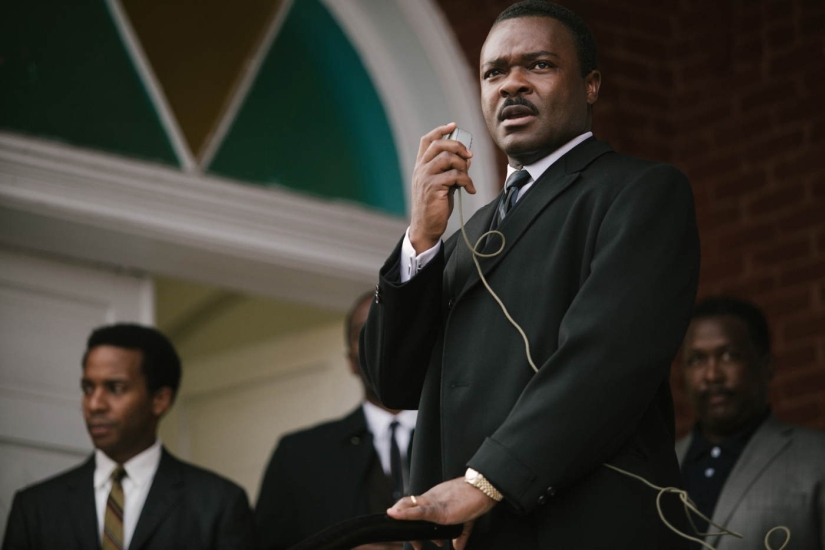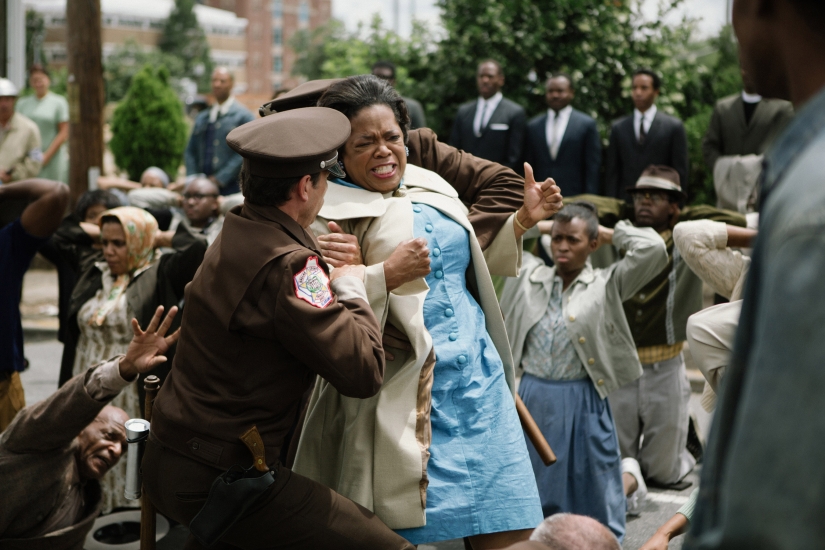As with every year, the big story following the announcement of the Academy Awards nominations is who got snubbed. This year, the most glaring omission was Selma.
The critically acclaimed film about the 1965 Selma to Montgomery marches snagged two Oscar nominations: Best Picture and Best Original Song (“Glory” by John Legend and Common). But nothing for Selma‘s director Ava DuVernay, or its star David Oyelowo, or cinematographer Roger Deakins, or screenwriter Paul Webb.
The optics of the snub are bad. As The Hollywood Reporter noted yesterday, the field of nominees for the major awards is predominantly white (and exclusively white in the acting categories). It’s left a number of people wondering if racism and/or sexism was involved with Selma‘s snub, or if the controversies involving Selma‘s depiction of President Lyndon Johnson were also a factor.
After exchanging emails with my friend Steve Kopian who runs Unseen Films, I think there’s something else going on even though race and gender are important to consider. It seems like the main reason Selma was snubbed had to do with its late release and poor awards season campaign, because in the end, the Academy Awards are a PR battle.
Selma was delivered to Paramount on November 26, which left limited time to get a robust award’s season strategy in motion. Given that, the main factors that led to the Selma snubs are probably the following:
- DVD screeners for Selma were only sent to Oscar and BAFTA voters; none were sent to voters of the Directors Guild of America (DGA), the Screen Actors Guild (SGA), the Producers Guild of America (PGA)
- Selma didn’t have a world premiere at one of the major year-end film festivals (i.e., the Toronto International Film Festival, the Telluride Film Festival, the New York Film Festival)
- Selma‘s limited Christmas release in select markets came too late to build the necessary Academy voter buzz
Earlier this week, Variety had a good rundown of the importance that DVD screeners played in all this. There’s the possibility that major industry players didn’t get their eyes on the film in time, or that they saw the film too late to change their minds about other films they saw earlier.
Production of official watermarked DVD screeners takes a while. Since the film was delivered late in November, the screener DVDs weren’t even ready to go to voters until December 18. By then, SAG’s voting period had passed and the PGA voting period was in full swing. Buzz and chatter back and forth between different groups of voters just wasn’t there, so no chance for little suggestions of award buzz being transferred from one set of industry voters to the next.
Sadly, despite the gambit, Selma wasn’t nominated for any BAFTAs.
Had Selma been completed earlier, some of this industry buzz could have been generated sooner at one of the major last-quarter film festivals. A movie can be elevated in the eyes of the industry simply by a major debut at a film festival, and it can help a movie in a unique way that a high-90s Tomatometer score can’t.
Since Selma was completed in late November, there was no chance that a satisfying version of the movie would be ready to play at Telluride or Toronto (both take place in September) or at the New York Film Festival (which takes place in October).
A working version of Selma played at the AFI Fest on November 11, two weeks before the final version of the movie was delivered. While the early buzz at AFI Fest was positive, again, it may have been too late to knock out earlier award season frontrunners, like Richard Linklater’s Boyhood (which debuted at Sundance), Wes Anderson’s The Grand Budapest Hotel (which debuted at the Berlin International Film Festival), Bennett Miller’s Foxcatcher (which debuted at Cannes), Alejandro Gonzalez Inarritu’s Birdman (which debuted at the Venice International Film Festival), and Morten Tyldum’s The Imitation Game (which debuted at the Telluride Film Festival).
Of course, Clint Eastwood’s American Sniper also played at AFI Fest, and despite the controversies around that film’s factual errors, it garnered six Oscar nominations, including Best Picture, Best Actor, and Best Adapted Screenplay. So what gives there? In terms of award season, I think there’s a unique case of Eastwood’s clout making a big difference, because clout goes a long way in the Oscar PR battle.
Eastwood’s an esteemed fixture in Hollywood given the longevity of his career. A late release by Eastwood has a better chance of crashing the awards season than a late release by someone new in the eyes of Hollywood like DuVernay. Had Selma been released by The Weinstein Company rather than Paramount, perhaps Harvey Weinstein would have glad-handed it into the major awards somehow. That’s the power of clout.
But after the behind-the-scenes industry stuff, we’re left with the nominations themselves and a look at how they reflect or are interpreted through the lens of real-world politics regarding race and gender. And I can’t deny it looks bad.
The Selma snub seems especially egregious since this year’s nominees play into a particular and persistent narrative about the Academy of Motion Picture Arts and Sciences (AMPAS): they are a bunch of out-of-touch old white men. In fact, the Academy voters are 93% white, 76% male, and their average age is 63. (These stats come from a report by NPR from February last year.) Current AMPAS President Cheryl Boone Isaacs, an African-American woman, is pushing for diversity in AMPAS membership, but the push will take time.
The disappointment in this year’s Selma snub—maybe in most awards snubs, regardless of the medium—comes back to a narrative of blandness and the taste of the status quo getting reaffirmed, namely that the safest and least challenging works tend to be the ones that win; or in large groups of voters, it’s the consensus winner that gets the award even though voters felt more passionate about another set of works. (First is the worst, second’s the best, third is the nerd with the hairy chest, but fourth gets the award this year because it’s all right enough probably I guess.)
I don’t know if blandness is necessarily the case this year, though, given the strength of several of the movies that have been nominated for Oscars. But it’s weird to think that a movie like Selma might have fared much better at next year’s Academy Awards, given a whole 12 months to roll out a well-planned campaign rather than just one rushed and chaotic month. If Selma debuted at the Sundance Film Festival later this month or at Berlin in February, and if it rode that acclaim through 2015… but even then, who’s to say?



